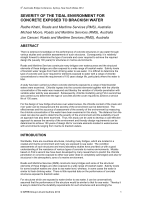Bridges

Severity of the Tidal Environment for Concrete Exposed to Brackish Water
- Publication no: ABC-IAR104-14
- Published: 22 October 2014
- PDF (free) Download
Roads and Maritime Services NSW constructs many bridges over watercourses and the structural elements of these bridges are often exposed to a wide range of brackish water. Salinity levels of brackish water range from fresh drinking water to sea water. It is difficult to determine the type of concrete and cover required for elements exposed to water with a range of chloride concentrations to meet the requirement of 100-years design life, particularly where the water is tidal. A study has been carried out where concrete elements exposed to a range of tidal brackish waters were examined. Chloride ingress into the concrete elements together with the chloride concentration of the water was measured and thereby the variation of chloride penetration with variable water salinity was assessed. Subsequently, chloride modelling using Ficks second law was carried out to determine the type of concrete and the cover required to achieve a service life of 100 years. For the design of new bridge structures over watercourses, the chloride content of the creek and river water can be measured and the severity of the environment can be determined. The effectiveness and the accuracy of assessment of the severity of the environment by measuring the chloride concentration of the water have been examined in this study. The distance from the coast can also be used to determine the severity of the environment and the suitability of such an approach has also been examined. Thus, this study can be used to develop a cost-effective approach to assess the severity of the environment and thereby design requirements can be determined to achieve 100 years of design life for concrete elements located in watercourses with environments ranging from marine to brackish waters.
Related publications
ATM-780-23
ATS-5315-23
ATS-5341-23
Latest Bridges News
